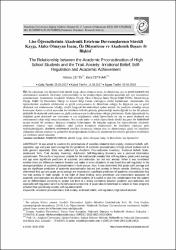| dc.contributor.author | Çetin, Nilüfer | |
| dc.contributor.author | Ceyhan, Esra | |
| dc.date.accessioned | 2019-10-22T20:13:38Z | |
| dc.date.available | 2019-10-22T20:13:38Z | |
| dc.date.issued | 2018 | |
| dc.identifier.issn | 2536-4758 | |
| dc.identifier.uri | https://dx.doi.org/10.16986/HUJE.2017028261 | |
| dc.identifier.uri | https://hdl.handle.net/11421/22585 | |
| dc.description | WOS: 000429445600011 | en_US |
| dc.description.abstract | It was aimed to examine the contributions of variables related to trait anxiety, irrational beliefs, self-regulation, age and grade point average for the prediction of academic procrastination of high school students and in both genders separately. Data was collected by Academic Procrastination Inventory, Irrational Beliefs Scale-Adolescent form, Trait Anxiety Inventory, Adolescent Self-Regulatory Inventory and a personal information questionnaire. The results of regression analysis for the total sample revealed that self-regulation, grade point average and age were significant predictors of academic procrastination, but not trait anxiety. When it was considered whether there are differences between females and males in terms of pattern, it was found that self-regulation is the strongest predictor of academic procrastination in both groups. Also; it was determined that grade point average and age are significant predictors of academic procrastination but not trait anxiety in female sample. Similarly, it was determined that age and grade point average are respectively significant predictors of academic procrastination but not trait anxiety in male sample. In the light of these finding, when prevention and intervention assistance of academic procrastination are planned for high school students, it is useful to take into consideration that this pattern can be differentiated according to gender and there is a strong correlation between academic procrastination and especially self-regulation which is the behavioral component. It would also be beneficial to include in these programs activities that specifically develop self-regulation skills. | en_US |
| dc.language.iso | tur | en_US |
| dc.publisher | Hacettepe University | en_US |
| dc.relation.isversionof | 10.16986/HUJE.2017028261 | en_US |
| dc.rights | info:eu-repo/semantics/openAccess | en_US |
| dc.subject | Academic Procrastination | en_US |
| dc.subject | Trait Anxiety | en_US |
| dc.subject | Irrational Beliefs | en_US |
| dc.subject | Self-Regulation | en_US |
| dc.subject | High School Students | en_US |
| dc.title | The Relationship between the Academic Procrastination of High School Students and the Trait Anxiety, Irrational Belief, Self-Regulation and Academic Achievement | en_US |
| dc.type | article | en_US |
| dc.relation.journal | Hacettepe Universitesi Eğitim Fakültesi Dergisi-Hacettepe University Journal of Education | en_US |
| dc.contributor.department | Anadolu Üniversitesi, Tıp Fakültesi, Psikolojik Danışma ve Rehberlik Merkezi | en_US |
| dc.identifier.volume | 33 | en_US |
| dc.identifier.issue | 2 | en_US |
| dc.identifier.startpage | 460 | en_US |
| dc.identifier.endpage | 479 | en_US |
| dc.relation.publicationcategory | Makale - Uluslararası Hakemli Dergi - Kurum Öğretim Elemanı | en_US |
| dc.contributor.institutionauthor | Ceyhan, Esra | |


















